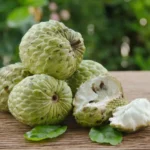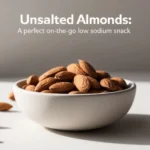Cucumbers are common in many gardens and homes because they are crisp, calm, and great for summer salads. But occasionally, a sour one sneaks in and surprises you with its bad taste. If this happened to you, you may have asked, “Are bitter cucumbers safe to eat?” This blog will tell you everything you need to know about bitter cucumbers, such as why they’re bitter, what makes them bitter, and whether you can safely eat them.
After reading this guide, you’ll be able to spot sour cucumbers and know how to avoid and deal with them so your next batch will be as tasty as it should be.
What Are Bitter Cucumbers?
A bitter cucumber has a sharp and unique flavor. Many people call it sour or bitter. Cucumbers are usually mild and sweet but can turn bitter and nasty when bitten.
Most of the time, the sharpness is concentrated in the skin and ends of the cucumber, but sometimes it can also affect the middle. Bitter cucumbers are a problem for farmers and shoppers because they can make a dish taste worse.
But sharpness isn’t just a taste problem; it also raises a serious health and safety issue about eating these cucumbers, which we’ll discuss soon.
Why Cucumbers are Bitter?
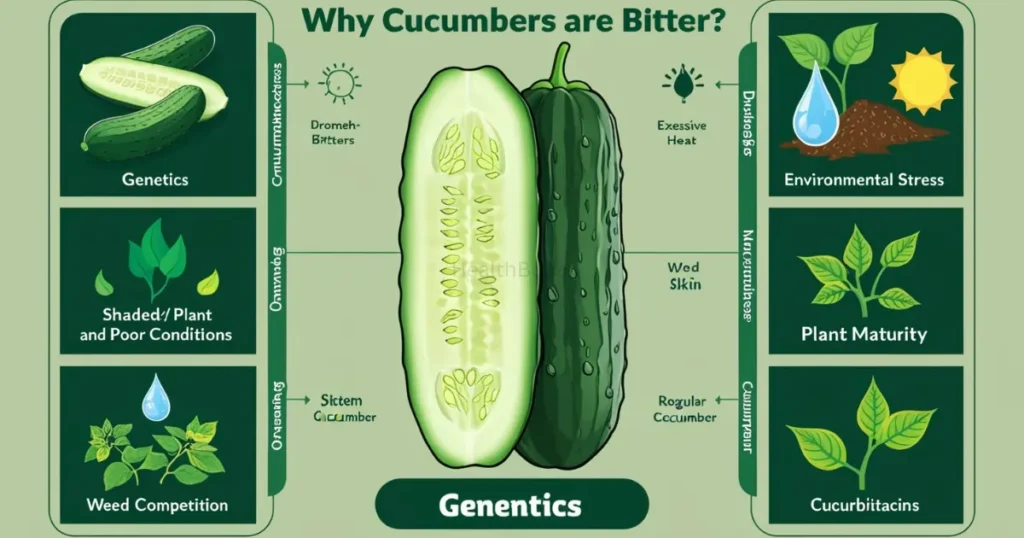
Because cucumbers contain natural chemicals called cucurbitacins, they can turn bitter. These chemicals help the plant defend itself naturally but can build up in some situations and make the food taste bitter.
Key Reasons for Bitter Cucumbers
1. Genetics
- It is natural for all cucumbers to have cucurbitacins, but they are generally only found in tiny amounts.
- Regarding cucumbers, rare or wild types tend to be more bitter.
- Because they are bred to be less bitter, mixed “burpless” cucumbers have less cucurbitacin.
2. Environmental Stress
Cucurbitacin production can increase in stressed growing conditions.
- Inconsistent Watering: Lack of water or uneven watering stresses the plant, making it bitter.
- Extreme Temperatures: Bitterness worsens in hot conditions, significantly when the fruit grows.
- Poor Soil Quality: Plants that don’t get enough nutrients or dirt that isn’t balanced can become stressed and produce bitter fruit.
3. Growing Conditions
- Shaded Growth: Cucumbers grown in too much shade may develop bitterness due to improper photosynthesis.
- Competition with Weeds: Stress caused by competing with weeds for nutrients and water can contribute to bitterness.
4. Plant Maturity
- Overly mature cucumbers tend to be more bitter.
- Cucumbers left on the vine too long develop higher concentrations of cucurbitacins, especially near the ends.
5. Location in the Cucumber
Bitterness is often concentrated in specific parts of the cucumber:
- Stem End: The end attached to the plant is typically the most bitter.
- Skin and Outer Layer: The peel often contains the highest levels of cucurbitacins.
- Seeds: Sometimes, the seeds can also be bitter.
6. Chemical Role of Cucurbitacins
- Cucurbitacins help protect cucumbers from pests and diseases.
- When a stressed plant produces more of these compounds as a defense mechanism, it produces more of these compounds as a defense mechanism.
How to remove bitter taste from cucumber
If you’ve encountered a bitter cucumber and want to salvage it, here are several methods to remove or reduce the bitter taste:
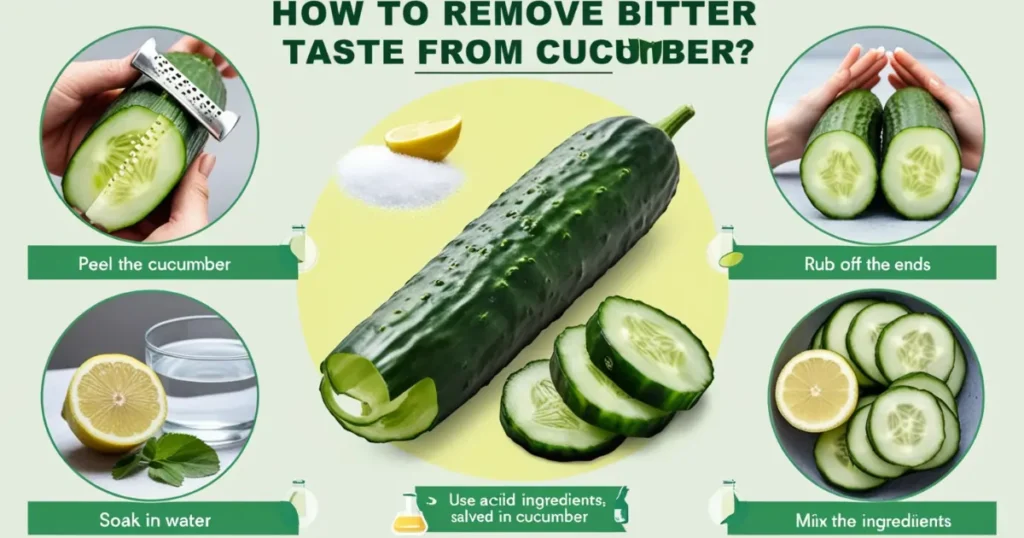
1. Peel the Cucumber
- The skin of a cucumber often contains the highest concentration of cucurbitacins (the compounds responsible for bitterness).
- How to do it:
- Use a vegetable peeler or knife to remove the skin.
- Taste the cucumber again after peeling. If it’s still bitter, proceed to other steps.
2. Cut Off the Ends
- Bitterness tends to concentrate at the stem end of the cucumber.
- How to do it:
- Slice off 1–2 inches from both ends of the cucumber, especially the stem (the rougher, drier end).
- Taste a slice from the middle to see if the bitterness is gone.
3. Rub the Ends
- Rubbing the cut ends of the cucumber is a traditional technique believed to draw out bitterness.
- How to do it:
- After cutting off an end, rub the exposed flesh in a circular motion against the cucumber until a white, frothy liquid appears.
- Wipe away the liquid, rinse the cucumber, and test the taste.
- Repeat on the other end if necessary.
4. Salt the Cucumber
- Salting can draw out the bitter compounds and improve flavor.
- How to do it:
- Slice the cucumber into rounds or strips.
- Sprinkle salt generously over the slices.
- Let them sit for 15–30 minutes.
- Rinse off the salt with cold water and pat dry before use.
5. Soak in Water
- Soaking in cold water can help dilute bitterness.
- How to do it:
- Submerge the peeled and sliced cucumber in a bowl of cold water.
- Let it sit for 15–20 minutes.
- Drain, rinse, and taste test.
6. Use Acidic Ingredients
- Acidic elements can counteract bitterness.
- How to do it:
- Marinate cucumber slices in lemon juice, vinegar, or a vinaigrette for a fresh, tangy flavor.
- It works exceptionally well for salads.
7. Mix with Other Ingredients
- Combine cucumbers with sweet or neutral ingredients to mask the bitterness.
- Suggestions:
- Add cucumbers to yogurt-based dips (e.g., tzatziki).
- Pair with honey, sugar, or fruits like watermelon in salads.
- Blend into smoothies with sweet fruits.
8. Cook the Cucumber
- Cooking can sometimes reduce bitterness as heat breaks down cucurbitacins.
- How to do it:
- Sauté, stir-fry, or roast cucumber slices.
- Add spices and seasonings to enhance the flavor.
Key Tip: Prevention
If bitterness is recurring, focus on buying high-quality cucumbers or growing them under optimal conditions to avoid the issue in the first place. With these methods, you can often rescue a bitter cucumber and make it more enjoyable!
How to identify bitter cucumbers?
You can avoid a shocking taste in the mouth if you look for a bitter cucumber before you eat it. Look for these things to tell the difference between a bitter cucumber and another kind:
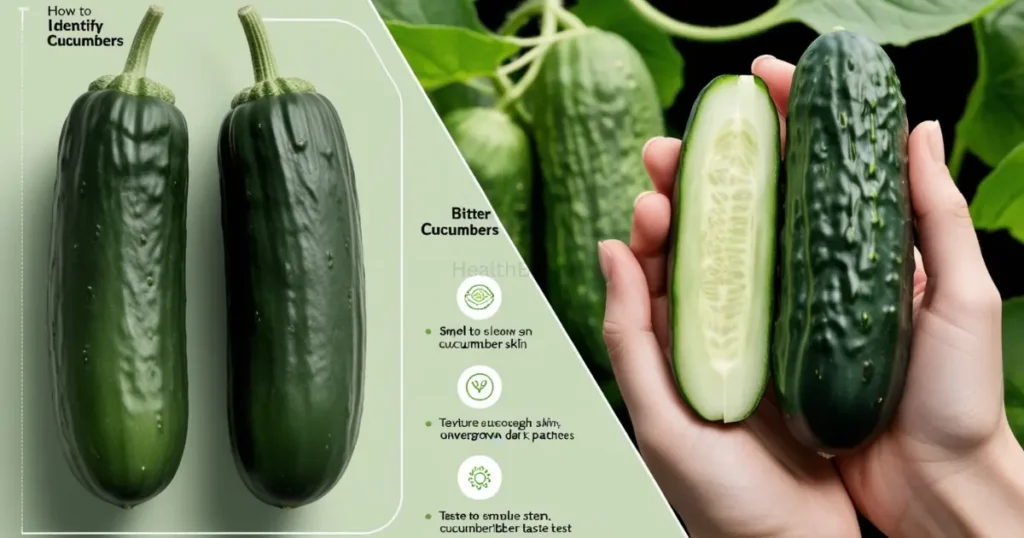
Identifying bitter cucumbers involves both visual inspection and a cautious taste test. Here’s how to spot bitterness before consuming or serving:
1. Visual Clues
- Size and Overgrowth: Overgrown or overly mature cucumbers are likelier to be bitter.
- Look for cucumbers that are unusually large, bulbous, or irregularly shaped.
- Color: Cucumbers with uneven or darker green coloring may indicate stress, which can increase bitterness.
- Stem End: Bitterness is often concentrated near the stem. Cucumbers with thick, woody, or dry-looking stems may be bitter.
2. Feel and Texture
- Hardness: A cucumber that feels overly firm or rubbery may indicate stress during growth, which can contribute to bitterness.
- Peel Texture: Tough or excessively thick skin can signal the presence of cucurbitacins.
3. Smell
- A slightly acrid or overly earthy smell could indicate bitterness when slicing the cucumber.
4. Taste Test (Carefully!)
Bitterness is usually the result of cucurbitacins, which are highly concentrated in certain parts of the cucumber. Follow these steps to taste test safely:
- Cut Off the Stem End: Bitterness is most likely near the stem or ends of the cucumber.
- Sample a Small Slice: Taste a thin slice from the middle of the cucumber (after removing the ends).
- Assess the Flavor:
- If it tastes mild, sweet, or fresh, it’s likely safe to eat.
- If it tastes bitter, avoid consuming it entirely, as the bitterness could indicate a high level of cucurbitacins.
5. Peeling the Skin
- If you’re unsure, peel the cucumber and retest. Sometimes, bitterness is concentrated in the peel and can be removed.
- If the flesh beneath the peel is also bitter, discard the cucumber.
6. Environmental Clues
If you grew the cucumber:
- Stress from drought, heat, or poor growing conditions can make cucumbers bitter. Inspect for signs of environmental damage or irregular growth.
Quick Tip: Use Your Tongue and Judgment
- Bitterness is often immediately apparent, even in small amounts.
- If bitterness is detected, it’s best to err on caution and discard the cucumber to avoid potential toxicity.
- Combining visual, tactile, and taste cues allows you to identify bitter cucumbers effectively before consuming or using them in recipes.
How to Prevent Bitter Cucumbers?
If you’re careful in the yard or care for the problem after the cucumbers are picked, you can keep them from turning bitter. Here are some valuable tips:
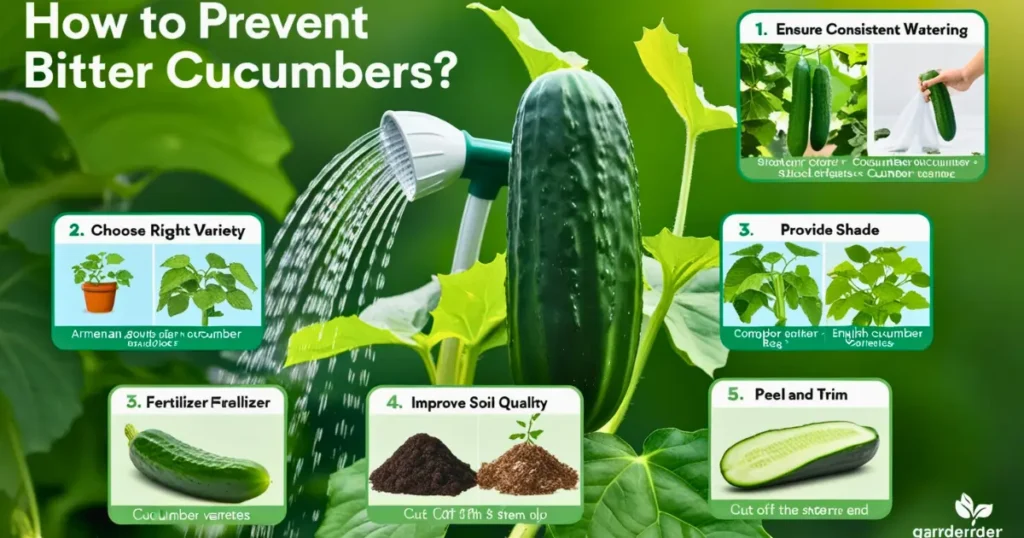
1. Choose the Right Variety:
- Choose cucumbers bred to be less bitter, like Armenian or English.
2. Ensure Consistent Watering:
- Consistently water your cucumber plants so they don’t get stressed out by changes in the amount of water they get.
3. Provide Shade:
- Use shade cloths or plant your cucumber plants somewhere with some shade during hot times to keep them from getting too hot.
4. Improve Soil Quality:
- To ensure the plants grow well, use compost or fertilizer to add more nutrients to the soil.
5. Peel and Trim:
- Even after taking care of it, if the cucumbers still taste bitter, peel them and cut off the ends, especially being careful with the stem end.
Are Bitter Cucumbers Safe to Eat?
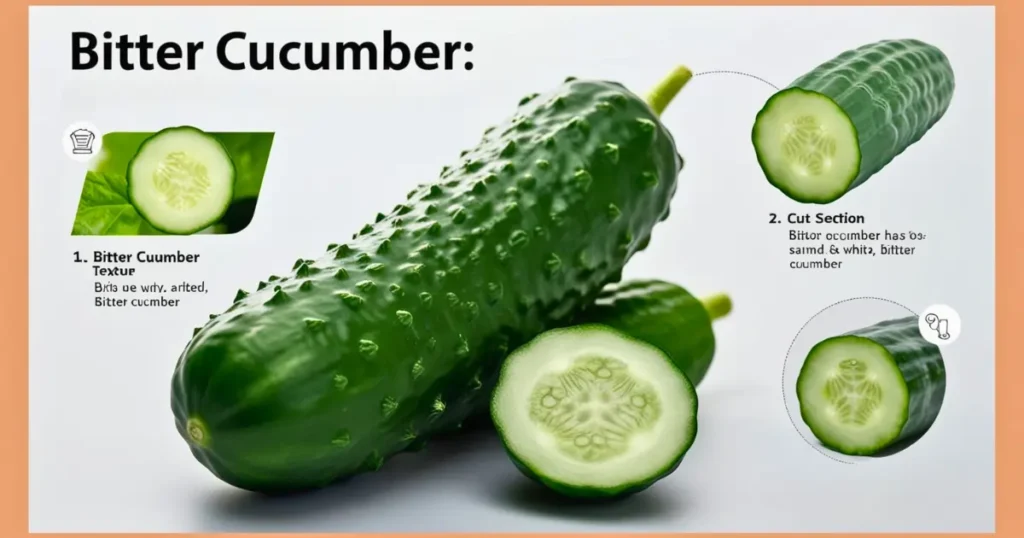
In short, you won’t get sick if you eat a few bitter cucumbers. There is no danger in small amounts of cucurbitacins. But too much of it can make your stomach hurt or lead to other health issues.
If the cucumber is bitter, it’s better to be safe than sorry and throw it away. Very sour cucumbers may have more cucurbitacin, which can make you sick or give you diarrhea if you eat a lot.
Final Thoughts
Unfortunately, most farmers and people who eat cucumbers will have to deal with bitter ones at some point. The bitter taste comes from natural chemicals called cucurbitacins, and eating small amounts is usually safe. However, they should cut off the peel and ends or not be there for very sharp cucumbers.
Perfect growing conditions, regular watering, and picking the correct type of cucumber will keep your next crop from becoming bitter.
Want more gardening advice or stories about keeping food safe? Sign up for our newsletter and stay updated!
Hi there! I’m content writer and blogger. With over two years of experience, I’ve shared my passion for writing across various platforms. I firmly believe in the transformative power of words and look forward to sharing this journey with you. Enjoy my work!



